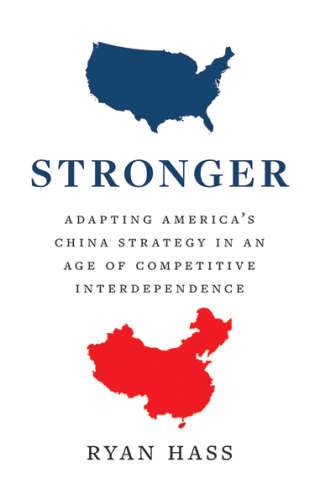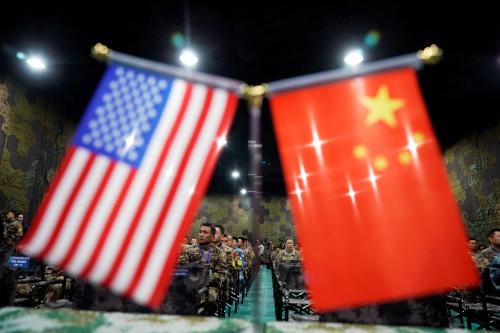This piece is part of a series titled “Nonstate armed actors and illicit economies: What the Biden administration needs to know,” from Brookings’s Initiative on Nonstate Armed Actors.
China’s sprawling domestic security apparatus received significant attention over the past year, as brutal police crackdowns in Hong Kong and an expanding digital surveillance state in Xinjiang filled the news. Much of this coverage has focused on Beijing’s export of its digital surveillance technology, but these tools are only one way in which China is exporting its domestic security know-how.
As China works to position itself as a global security partner, it is also expanding the international mandate of its domestic security agencies, building new institutional partnerships that link China’s internal security apparatus to foreign counterparts. Here, I explore China’s international law enforcement activities and discuss their implications for U.S. and like-minded policymakers.
A comprehensive security cooperation partner
Under Hu Jintao and Xi Jinping, China has steadily expanded its overseas security role, embracing global missions for the People’s Liberation Army (PLA) that focus on non-traditional security threats such as peacekeeping, disaster response, and counterterrorism. Although China’s global ambitions have become more apparent, the top driver of China’s overseas security missions continues to be its own domestic security. China’s emphasis on non-traditional security threats supports what China’s leaders have described as a “comprehensive” or “holistic” national security vision that fuses not only traditional and non-traditional security threats, but also more explicitly connects domestic and international security concerns. China’s 2015 defense white paper makes this clear, arguing that “China’s own security and the common security of the world” are linked together. While emphasizing China’s shared interest in addressing transnational threats, Beijing’s management of these problems is often one-sided, focused primarily on its own domestic concerns. On issues ranging from opiate production to illegal fishing, Beijing has been reluctant to crack down on domestic actors contributing to problems elsewhere in the region.
Among Beijing’s top policy priorities under Xi Jinping has been to expand the Chinese Communist Party’s (CCP) control over Chinese society, establishing “tech-based approaches to social control” that enhance the party-state’s power. As China’s interests and citizens move overseas, this task has increasingly taken on an international emphasis as well as a domestic one, making international law enforcement cooperation a key concern for the CCP. This has, in turn, established a more prominent international mandate for agencies such as China’s powerful Ministry of Public Security (MPS). China’s February 2017 Public Security International Cooperation Work Conference emphasized this point, calling for the “internationalization of public security work” and advocating the need to “actively build a law enforcement security cooperation system with Chinese characteristics.”
Chinese law enforcement cooperation in action
Over the past several years, China has concluded international law enforcement cooperation agreements on issues ranging from intelligence sharing to judicial cooperation and joint police operations. A 2017 report by the Mercator Institute for China Studies shows Chinese law enforcement agreements now spanning every major region of the world. Of particular importance to Beijing, China has reportedly signed 59 extradition treaties with foreign partners, a number that has nearly doubled under Xi’s tenure.
China is pursuing a multi-faceted approach to its global law enforcement push, incorporating a range of actors beyond national-level security agencies, including private security and technology companies as well as provincial and local-level security authorities. Many of China’s provincial public security bureaus and their affiliated police academies now tout international exchange and training programs aimed at sharing China’s best practices with foreign partners. The police academy in China’s eastern Shandong province, for example, holds an annual training course for African law enforcement officials that includes such topics as Chinese anti-terrorism laws, China’s public security management system, and “cyber terrorism.” The Yunnan Police College in Kunming established a new China-Association of Southeast Asian Nations (ASEAN) Law Enforcement Academy in 2016, which pledged to provide free law enforcement training and education for 2,000 Southeast Asian officials. Similarly, Beijing’s Municipal Public Security Bureau has built a larger international presence, concluding cooperation agreements with 10 capital cities in Central Asia, establishing a China-Italy “joint patrol” arrangement in 2017, and hosting international police symposiums for foreign counterparts in Beijing.
Chinese technology companies such as Huawei have also become active participants in China’s global law enforcement enterprise, providing capacity-building and training to support the digital surveillance tools they offer to foreign governments. Chinese companies often coordinate with the MPS in providing this assistance. A 2019 report by the Australian Strategic Policy Institute highlights the role that Meiya Pico, a prominent Chinese digital forensics company, has played in supporting the MPS’ law enforcement cooperation activities. In addition to constructing “digital forensics laboratories” as part of China’s Belt and Road Initiative (BRI) assistance, Meiya Pico also claims to have supported the MPS in providing technical training to police forces in 30 countries.
China’s global law enforcement ambitions
What does China hope to achieve through its global law enforcement campaign? China’s activities support its broader foreign policy goals, including:
- Securing China’s overseas investments. China’s sweeping BRI is creating new security challenges for Beijing, which has expanded its overseas interests and investments in a range of countries struggling with domestic instability. Chinese officials acknowledge that the “security risks to China’s overseas interests are on the increase,” a trend which is of concern to Beijing. China leverages a variety of law enforcement activities to help bolster partner nations’ internal security capabilities and better secure its BRI investments. In addition to offering bilateral aid and assistance and promoting “safe city” technologies, China is working to establish multilateral law enforcement cooperation along BRI routes. In Central Asia, China has advocated for regional cooperation to protect transnational oil and gas pipelines. With African partners, China has offered railway security training to better protect rail lines funded by Beijing. And in Southeast Asia, China has established joint maritime patrols with Southeast Asian partners aimed at preventing attacks on riverine shipping along the Mekong River.
- Extending China’s extraterritorial reach. Over the past several years, Beijing has become increasingly concerned with the state’s ability both to protect Chinese citizens living abroad as well as to extend the CCP’s extraterritorial reach over its citizens’ activities. China’s international law enforcement cooperation serves both aims. In European countries such as Italy, Serbia, and Croatia, China has established joint police patrols in major cities aimed at protecting the safety of Chinese tourists traveling overseas. The more prominent element of China’s global law enforcement cooperation, however, has been its expanded use of international police liaisons, intelligence sharing arrangements, and bilateral extradition treaties as a means of better controlling China’s overseas citizens. Under Xi, China has launched a wide-ranging anti-corruption China has leveraged its international law enforcement partnerships to prosecute this campaign, facilitating mass arrests and deportations of Chinese citizens on charges including fraud, money laundering, and cyber crimes. China has similarly used its law enforcement partnerships to extend its domestic counter-terrorism efforts, leaning on neighbors such as Thailand and Malaysia to extradite Uyghur Muslims back to Beijing.
- Advancing new norms for global security governance. Finally, China views global law enforcement cooperation as a means of better legitimating its domestic security model. Through international police exchanges and training, as well as an increasing presence in international organizations such as Interpol, Beijing is working to “normalize” the idea of digital social controls and build international support for more robust internal security practices. Xi Jinping’s remarks to the 86th Interpol General Assembly make clear that China views its model as a template for a more “efficient” system of global security governance, one which he argued should be reformed to provide a more “systematized, scientific, intelligent” system of “social management.” While many democratic governments have pushed back against China’s expansive security vision, Beijing has found a greater openness to its approach among non-democratic partners in particular. A 2018 Freedom House report, for example, highlights Vietnam’s introduction of a new cybersecurity law that closely aligns with China’s own legislation following a 2017 training session for Vietnamese officials. Similarly, a recent minority staff report for the U.S. Senate Committee on Foreign Relations notes the Nicolas Maduro regime in Venezuela has used training and technology provided by Beijing to build a more expansive social management system.
Policy implications
Beijing’s influence over the global law enforcement regime is unlikely to fade away. Recent analysis by Brookings non-resident senior fellow Sheena Greitens shows that China’s domestic surveillance tools have already been adopted by over 80 countries since 2008, a trend that is likely to further expand the influence of China’s norms and practices over time. The United States and like-minded democracies will need to better coordinate their own security practices and international activities to contend with this influence. Two issues in particular merit closer attention.
First, like-minded democracies should push back more aggressively against China’s broad view of its extraterritorial reach and power. In the past few years, China has expanded its ability to police not just Chinese nationals overseas, but to detain and repatriate dual nationals and Taiwan residents as well. Article 38 of the new Hong Kong National Security Law takes China’s extraterritorial reach one step further, arguing the law’s provisions can be applied to offences committed “from outside the Region by a person who is not a permanent resident of the Region,” a statement that provides the Chinese state with an almost unlimited ability to justify the detainment of foreign citizens as well as Chinese nationals. Like-minded democracies will need to coordinate more closely in imposing costs on China for its efforts to enforce these provisions and for any coercion of both foreign nationals and Chinese overseas citizens.
Second, the U.S. and other like-minded partners will need to reinforce civilian law enforcement assistance and criminal justice training for foreign partners. China’s digital surveillance technology is only one aspect of what Beijing is offering to partners. China is working to establish full-spectrum partnerships that provide digital tools at limited cost, train foreign partners on their use, provide advice on supporting judicial and legislative initiatives, and enable information-sharing and joint operations. The U.S. has long-standing and successful initiatives, such as its five State Department-funded International Law Enforcement Academies, to offer to foreign partners. Enhanced funding for these civilian initiatives should be a priority if the United States hopes to compete with China’s overseas influence.
As China builds a more prominent role on the global stage, it is unsurprising that it would seek to cooperate on law enforcement concerns with international partners. Yet China roots these relationships in a domestic ideology that places the security of the state — and the CCP in particular — above the value of the individual, an approach that is discordant with the values of the United States and other like-minded democracies. Further expansion of China’s domestic security model throughout the international system would have profound implications for global human rights, the rule of law, and the security of U.S. citizens. The U.S. and democratic allies will need to be prepared to address this challenge.
The Brookings Institution is committed to quality, independence, and impact.
We are supported by a diverse array of funders. In line with our values and policies, each Brookings publication represents the sole views of its author(s).










Commentary
Extending the long arm of the law: China’s international law enforcement drive
January 15, 2021